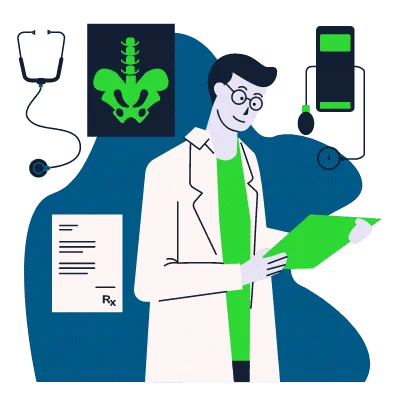- +91 8480003645
- [email protected]
- Mon - Fri: 9:30 - 18:30
Clinical research involves testing a healthcare product on human beings to determine its usefulness in health care. The product could be a drug, vaccine, device or any blood or biological product.
Clinical research also involves research exploring
No. Clinical research is patient or healthy volunteer studies generally carried out in hospitals.
Phase I
Stage I thinks about the survey of the security of medication or gadgets. This underlying period of testing, which can take a while to finish, more often than excludes few solid volunteers (20 to 100), who are by and large paid for taking an interest in the examination. The investigation is intended to decide the impacts of the medication or gadget on people including how it is retained, utilized, and discharged. This stage additionally explores the reactions that happen as measurement levels are expanded. Around 70% of exploratory medications pass this period of testing.
Phase II
Checks the adequacy of medication or gadgets. This second period of testing can last for a while to two years and includes up to a few hundred patients. Most stage II thinks about are randomized trials where one gathering of patients gets the test tranquilize, while a moment “control” aggregate gets a standard treatment or fake treatment. Regularly these examinations are “blinded” which implies that neither the patients nor the specialists know who has gotten the trial tranquilize. This enables agents to give the pharmaceutical organization and the FDA with near data about the relative security and adequacy of the new medication. Around 33% of test sedates effectively total both Phases I and Phase II ponders.
Phase III
Thinks about include randomized and daze testing in a few hundred to a few thousand patients. This extensive scale testing, which can most recent quite a while, gives the pharmaceutical organization and the FDA with a more careful comprehension of the adequacy of the medication or gadget, the advantages and the scope of conceivable unfavorable responses. 70% to 90% of medications that enter Phase III investigations effectively entire this period of testing. When Phase III is finished, a pharmaceutical organization can ask for FDA endorsement for promoting the medication.
Phase IV
contemplates, frequently called Post Marketing Surveillance Trials, are led after a medication or gadget has been endorsed for the purchaser deal. Pharmaceutical organizations have a few targets at this stage: (1) to contrast a medication and different medications as of now in the market; (2) to screen a medication’s long haul adequacy and effect on a patient’s personal satisfaction; and (3) to decide the cost-viability of medication treatment in respect to other conventional and new treatments. Stage IV studies can bring about a medication or gadget being removed the market or confinements of utilization could be put on the item relying upon the discoveries in the investigation.
The pharmaceutical industry has changed the course of healthcare as they are in the business of saving lives. Apart from manufacturing, health care products that save and improve the lives of millions of people around the world, they invest in the discovery and development of new and better drugs, devices and vaccines. A key step in this process of innovation and development is Clinical Research. Clinical research is a process wherein evidence is collected to prove that a drug works and is safe to be marketed for use in humans. Without Clinical Research or evidence obtained through Clinical Research, a product cannot get approval for marketing.
In order to meet the constant need for better products for treatment, diagnosis, and prevention of diseases we NEED Clinical Research.
It is important to understand that while job profiles may be similar, the salary varies across companies and cities. With respect to shifts, most profiles within the clinical research industry would require you to work on a shift basis.
The following website provides an estimate of the median salary in clinical research: http://www.payscale.com/research/IN/Skill=Clinical_Research/Salary
The Indian pharmaceutical industry has predominantly been a generic pharma industry, which required minimal clinical testing for drug products. However this scenario is changing due to two factors, first, the growing domestic market and second, the potential for managing outsourced projects. In addition to this our pharmaceutical market is growing and diversifying from a generics industry to one entering into the field of discovering and marketing new drugs.
The growing number of patients with lifestyle diseases, an educated English speaking workforce (healthcare sector) and improving regulations have made India a popular destination for outsourcing clinical research activities. In addition to this, the decreased cost of research contributes to India being a preferred location for clinical research.
Storage and management of data generated from clinical trials is referred to as clinical data management. The CDM department supports the analysis team by converting raw data into accurate, valid data. CDM is an IT enabled service requiring customized software to collect, integrate and report data. As it is an IT enabled service apart from CROs (Contract Research Organization), software companies also have CDM departments. These companies require candidates who are well versed with clinical research and clinical data management concepts.
You do not need to learn a programming language for CDM. The CDM process requires you to use software(s). However different companies use different software, it’s sufficient to be familiar with one to understand the process. At BCRI you will be given hands-on hands-along with OpenClinica
Pharmacovigilance is the process of monitoring drugs, devices, and vaccines after they are marketed. The process includes detection, assessment, and reporting of adverse reactions of drugs, devices or vaccines. Pharmaceutical companies are required by law in all countries to perform drug safety monitoring activities during and after clinical trials. This requires a dedicated CRO or drug safety department to collect individual adverse reaction reports, assess them and report it to regulatory departments as per the local regulations.
Graduates and post-graduates from life sciences, pharmacy, medicine, nursing, physiotherapy, and dentistry fields, who have clinical research training are eligible to be a clinical research professional.
What are the career prospects in Clinical Research?
If you have the right educational & training background it is easy to enter and excel in this industry.
Opportunities in clinical research operations:
Opportunities in clinical data management
Opportunities in QA
Opportunities in scientific writing
Opportunities in Pharmacovigilance

Bangalore Clinical Research Institute
WhatsApp us
Our Team would love to Guide you to select the right course here .
